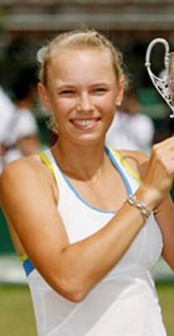ISTANBUL, (Reuters) – Statistically Caroline Wozniacki remains the best female tennis player in the world but the controversy over her number one status showed no signs of abating after her season ended in disappointment at the WTA Championships.
True, the 21-year-old Dane won six titles, amassed more victories (63) than any of her rivals and topped the end-of-year rankings for a second consecutive year.
However, when asked who was the stand-out player of 2011, none of the seven other women who qualified for the season-ending finale in Istanbul named Wozniacki.

Former world number one Maria Sharapova, who battled back to the top four from injury, was mentioned, as was the player of the moment Petra Kvitova, who capped a remarkable season by winning the Championships undefeated on Sunday.
Czech Kvitova has emerged as the new force in women’s tennis and there is an air of inevitability about her rise to the top of tree after she beat another challenger to Wozniacki, Victoria Azarenka, to win the prestigious title on her debut.
The 21-year-old is not there yet — she still lags 100 or so points behind Wozniacki — but with a grand slam title to her name already and a destructive game that, when working, is almost unstoppable, the Wimbledon champion appears to be the number one in waiting.
But what of Wozniacki?
Despite spending all but a week as number one since last October, she failed to reach a single grand slam final this year and her lack of a major among her 18 career titles is beginning to weigh heavily on her shoulders.
While the WTA Tour points to the fact that the rankings system rewards consistency, the fact that Wozniacki has so far failed to shine on the biggest stages gives plenty of ammunition to those who say she is there by default.
Wozniacki, the theory goes, has benefited from injuries to the likes of Serena Williams and Kim Clijsters and from the fact that some of her peers are still developing their games.
Williams, and before her the likes of Martina Navratilova, Steffi Graf and Monica Seles, used to provide the ultimate benchmark for women’s tennis in various spells of domination but Wozniacki, despite racking up victories, points and dollars, lacks that authority.
She may still be just 21, but both Serena and Venus Williams, Seles, Graf, Martina Hingis and Sharapova all had a clutch of grand slam titles in the bag at the same age.
All of those, with the exception of Hingis whose brain was possibly her greatest strength, could also dominate opponents in a way that Wozniacki’s solid percentage game cannot.
When it gets down to the later stages of a major, the chances are Woznaicki will run into a player with the weapons to break down her barricades.
“She’s certainly not the best player in the world at her best, but at her worst she’s probably the best player in the world compared to the others,” former men’s world number one Mats Wilander said this week.
MAJOR STRENGTH
It is a recipe for the kind of consistency in results which U.S. Open champion Samantha Stosur believes is Wozniacki’s major strength.
“Kvitova’s got a lot more visible weapons than what Caroline has,” the Australian told Reuters after losing to Kvitova in the semi-finals at the Championships.





